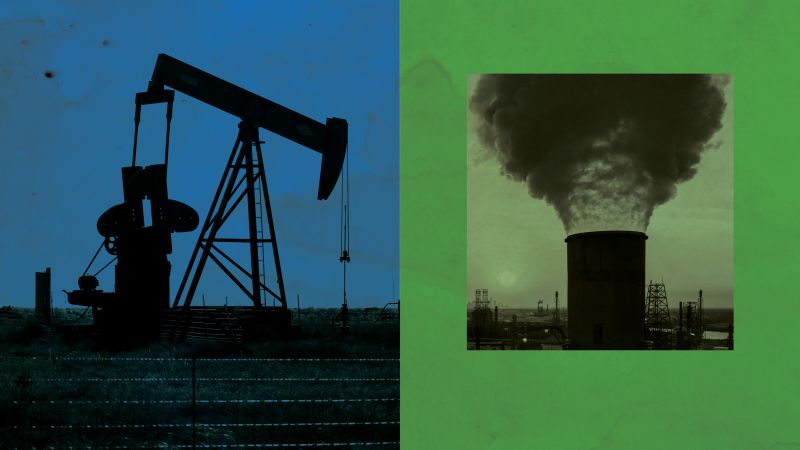The Environmental Protection Agency (EPA) has reportedly advised its staff responsible for monitoring pollution in the industrial Midwest to cease enforcement actions against fossil fuel companies. This information comes from multiple sources who spoke with CNN about the directive, which was communicated verbally to surprised employees in recent months.
Insiders claim there is significant pressure within the EPA to reduce scrutiny of the oil and gas sector, which aligns with a broader agenda for deregulation spearheaded by EPA Administrator Lee Zeldin at the request of President Donald Trump. Since taking office, Trump has aimed to dismantle what he deems ‘burdensome’ regulations on the oil and gas industry while promoting increased production.
As part of this approach, the EPA has begun rolling back climate and pollution regulations introduced during former President Joe Biden’s administration, particularly those targeting fossil fuel emissions. Last week, Zeldin suggested measures to weaken restrictions on airborne toxins and to repeal regulations aimed at reducing climate pollution from fossil-fuel power plants.
Even prior to the formal adoption of these changes, the EPA has noticeably reduced enforcement, a shift that many agency insiders believe is unprecedented in the face of transitions between administrations. An EPA spokesperson reassured CNN, stating that ‘inspections and enforcement continue to occur in the energy and oil and gas industries.’
Additionally, the enforcement branch has seemingly been left without support from the US Department of Justice’s environmental division, where staff reductions due to buyouts and layoffs have significantly impacted resources. ‘The companies are scoffing at the cops,’ remarked one EPA enforcement staffer. ‘EPA enforcement doesn’t have the leverage they once had.’
The growing concerns within the EPA emerged early in Trump’s administration when staff were asked to prepare case details for review by higher management. They were specifically directed to highlight violations related to fossil fuel companies. One source noted the unusual nature of this request, voicing apprehensions about whether any such investigations would be resumed.
Sources from the EPA’s Region 5 office, which supervises six Midwestern states, revealed that staff were informed during meetings that there was an effective ‘pause on oil and gas enforcement.’ This interpretation of signals from the president reflects a broader shift in management’s priorities. Enforcement officials have reportedly been unable to issue notices of violation or send information requests to oil and gas companies suspected of pollution—essentially halting court actions against them.
Among the states covered by Region 5 is Ohio, which accounted for approximately 5% of US marketed natural gas production in 2024, along with significant facilities like the Whiting Refinery, the largest BP refinery globally. Region 5 is noted for having the highest number of enforcement staff among any EPA offices and has historically led in notable legal cases.
Reports suggest that enforcement has also stalled in EPA Region 6, which encompasses prominent oil and gas states like Texas, Louisiana, and New Mexico. Although violation notices are still being technically issued, there is a notable lack of direction on how to proceed with these cases.
Concerns have grown regarding the agency’s changing dynamics with the fossil fuel industry, with sources indicating that information requests aimed at oil and gas companies have drawn increased scrutiny. In one instance, an attorney for a fossil fuel company contacted a political appointee regarding an inquiry. Following this, the appointee began questioning the motives of EPA officials, signaling a chilling effect on enforcement activities.
Recent enforcement data suggest a concerning trend: there has been a 32% decrease in the total number of EPA enforcement cases initiated or closed since Trump began his second term, compared to the same timeframe under Biden. Moreover, nearly 60% fewer cases were recorded than during the first three months of Trump’s initial term.
This preliminary data aligns with a memo from March 12, issued by the then-acting enforcement chief, Jeffrey Hall, directing staff to consult with Trump-appointed officials before proceeding with enforcement actions. The memo emphasized that actions ‘shall not shut down any stage of energy production’ except in cases posing imminent threats to human health.
Former EPA official David Uhlmann expressed alarm over any suspension of enforcement specific to the fossil fuel industry, asserting that it provides an unjust advantage to companies that disregard the law. ‘This will make climate change worse and leave communities unprotected from harmful pollution,’ he remarked.
Though an EPA spokesperson maintained that enforcement actions in the fossil fuel sector continue in alignment with Trump’s executive orders, he highlighted that all current settlements were initiated and negotiated during Biden’s administration.
With the department’s enforcement division significantly weakened, several EPA members noted their inability to negotiate penalties or address violations related to the oil and gas industry. ‘It’s not a small problem, it’s a big problem,’ one employee stated.
Despite personnel reductions, a Justice Department official contended that the Environmental and Natural Resources Division remains committed to its usual enforcement activities. The Justice Department has, however, actively defended the fossil fuel industry, recently filing lawsuits against multiple states for their attempts to penalize fossil fuel companies for climate change-related damages.
Interestingly, some companies within the oil and gas sector, such as ExxonMobil, have voiced support for stricter regulations on methane leaks, recognizing the economic benefits of capturing and selling these emissions. A report by the Institute for Energy Economics and Financial Analysis suggested that tightening enforcement could help companies recover approximately $4.6 billion worth of natural gas lost through leaks over the next decade.
Mark Brownstein of the Environmental Defense Fund noted the paradox in the industry’s stance, stating, ‘The failure to enforce methane requirements is not just a problem for public health and the environment; it’s a waste of a national energy resource.’

